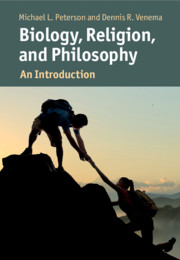Book contents
- Biology, Religion, and Philosophy
- Cambridge Introductions to Philosophy and Biology
- Biology, Religion, and Philosophy
- Copyright page
- Dedication
- Contents
- Acknowledgments
- Introduction
- Part I General Issues
- Part II Religion and Human Biology
- 6 Human Nature and Human Uniqueness
- 7 Love and Altruism in Biology and Religion
- 8 Biology, Ethics, and Debunking Arguments
- 9 Biological Accounts of Religion
- 10 Humanity, Religion, and the Environment
- Glossary
- Further Reading
- Index
8 - Biology, Ethics, and Debunking Arguments
from Part II - Religion and Human Biology
Published online by Cambridge University Press: 25 March 2021
- Biology, Religion, and Philosophy
- Cambridge Introductions to Philosophy and Biology
- Biology, Religion, and Philosophy
- Copyright page
- Dedication
- Contents
- Acknowledgments
- Introduction
- Part I General Issues
- Part II Religion and Human Biology
- 6 Human Nature and Human Uniqueness
- 7 Love and Altruism in Biology and Religion
- 8 Biology, Ethics, and Debunking Arguments
- 9 Biological Accounts of Religion
- 10 Humanity, Religion, and the Environment
- Glossary
- Further Reading
- Index
Summary
The application of evolutionary theory to morality has given rise in our day to a field known as “evolutionary ethics.” From the beginning, claims about how evolutionary ideas engage ethical thought have sparked controversy. Both Charles Darwin and Herbert Spencer provided their own distinctive evolutionary reasoning about the foundation, content, and function of human morality, while several well-known traditional philosophers, such as Henry Sidgwick, denounced and severely critiqued their views. Given the long-standing connection between ethics and religion, the issues become more complex. In this chapter, we explore the basic issues arising at the intersection of evolutionary ethics and religion – from how areas of ethics are affected to how religion is challenged, with particular attention to theism and Christianity. We also discuss important philosophical work regarding whether evolution debunks realist interpretations of religious ethics and how evolutionary ethics is interpreted by both naturalistic and theistic worldviews.
- Type
- Chapter
- Information
- Biology, Religion, and PhilosophyAn Introduction, pp. 184 - 204Publisher: Cambridge University PressPrint publication year: 2021



